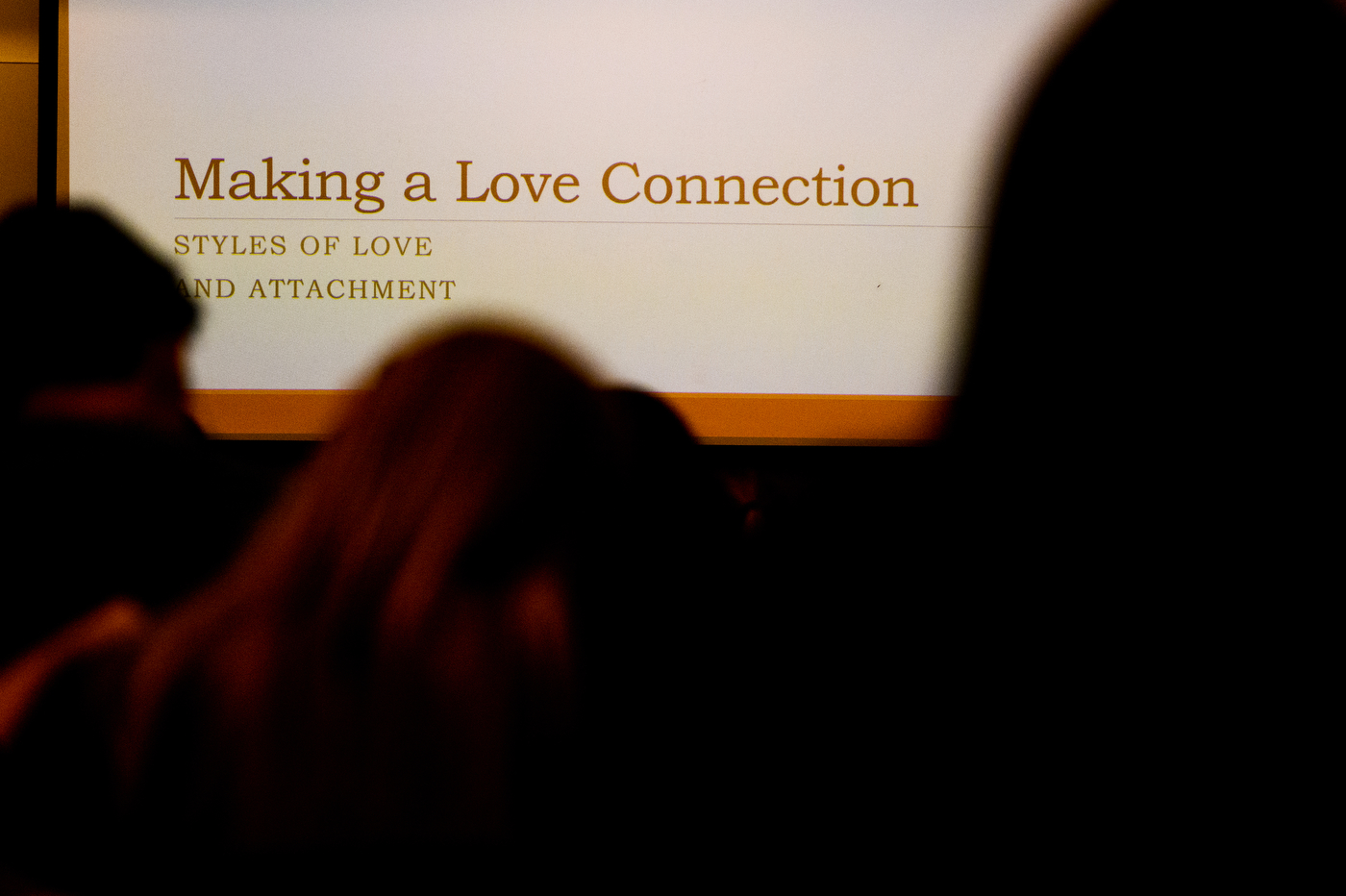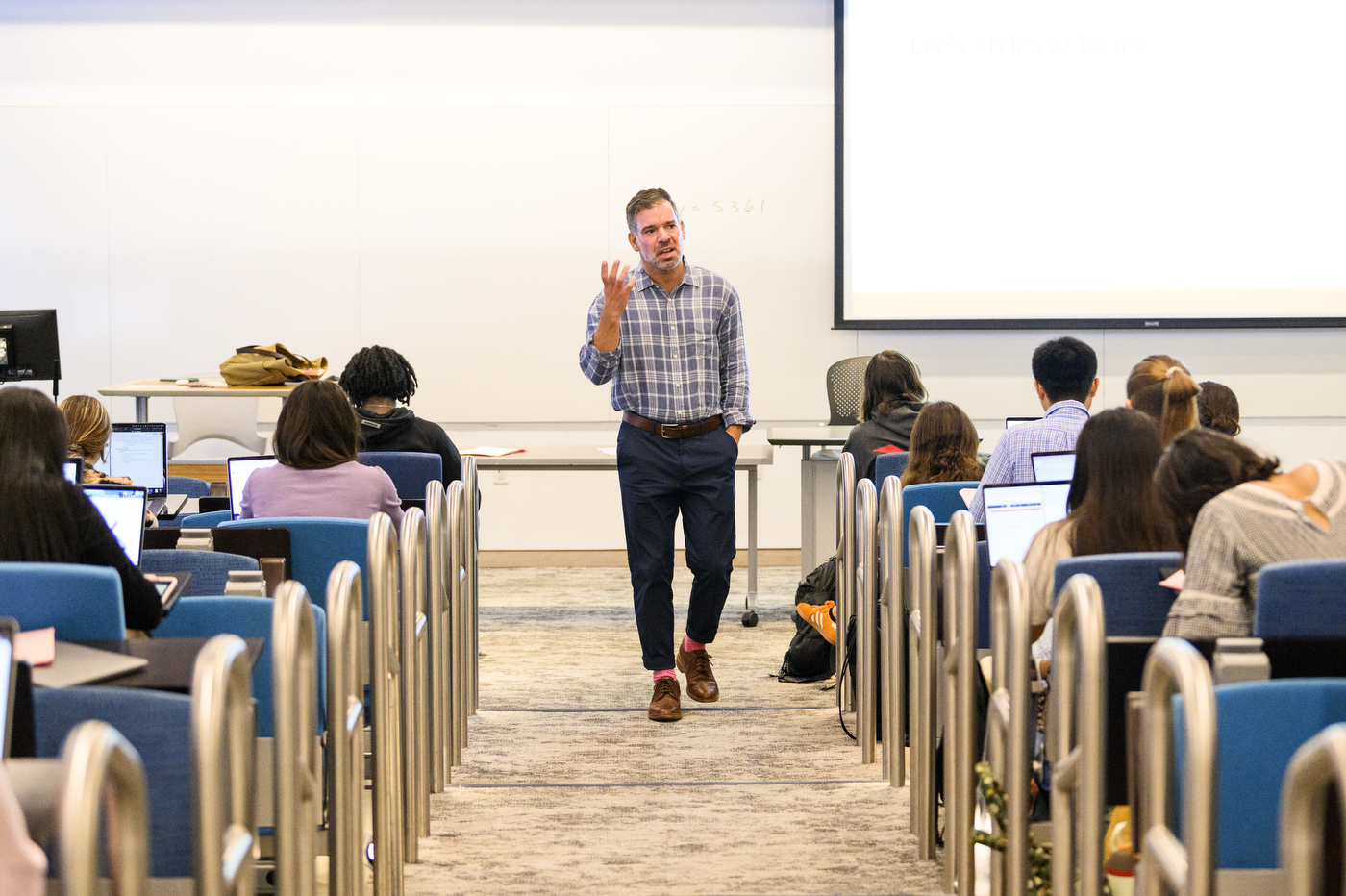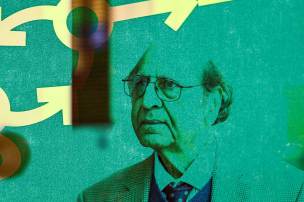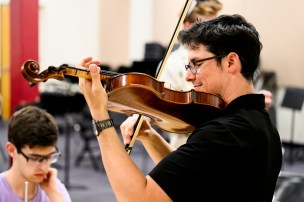Published on
Why Northeastern business and computer science majors take a sex and relationships class
Joseph Schwartz’s intro-level Communications Studies course goes deep on the dynamics of romance, family and close friendships. Students have found it invaluable for their careers, too.

At the beginning of a lecture for “COMM 1131: Sex, Relationships and Communication” in early October, professor Joseph Schwartz passes out a quiz on pink paper that looks like it could have come from a teen magazine. Called the “Love Attitudes Scale,” the questionnaire prompts the students to rate, on a scale from 1 to 5, how strongly they agree with a few dozen statements about their approaches to intimate relationships — I feel that my lover and I were meant for each other; Our friendship merged gradually into love over time; One consideration in choosing my partner was how he/she would reflect on my career; When my partner doesn’t pay attention to me, I feel sick all over.
Scores correspond to six different “love styles” — some people prioritize passion and physical chemistry (Eros); others value more practical functionality (Pragma). Still others prefer to keep things fun and casual (Ludus).
The concept of love styles, first articulated by sociologist J.A. Lee in the 1970s and developed into the scale by researchers in the ’80s and ’90s, is a foundational tool for counselors and other relationship experts. At its core is the idea that even with something as fundamental as love, people have wildly different approaches.

“We have a bias that kind of our way of loving is the only way, but Dr. Lee made a big point that there isn’t one best style,” Schwartz tells the class. “Each style has its positive and negative attributes.”
“If you understand your love style, you’ll better understand what your priorities are,” he continues. “And you’ll be able to better understand what your partner needs and values.”
The “Love Styles” lecture is a perennial highlight of the popular Northeastern University course, but it represents a fraction of the subject matter — despite the name, Sex, Relationships and Communication is really about navigating close relationships of any stripe — within families, strong friendships, even workplace interactions.
“I try to have something for everyone,” Schwartz says in an interview after the lecture. “Not everyone is in a romantic relationship or dating. So I try to talk about close friendships; I do family communication, a little bit with hookups. I do a whole unit on conflict, which is really interesting because a lot of the way we handle conflict is intergenerational — we reproduce what we see our parents do.”
He sees the class as an important complement to Northeastern’s laser-focused, career-oriented ethos.
“Relationships are one of the strongest predictors of being satisfied in your life,” Schwartz says. “We do a really good job of preparing students for their professional careers through co-op and whatnot. But we also need to consider the whole person; you can’t be happy with only the career piece.”
Schwartz, who joined Northeastern’s Communication Studies department in 2008, specializes in the more delicate, fraught realms of interpersonal interactions. As a researcher, his focus is on communication and HIV prevention among men who have sex with men; a recent paper delves into the stigma faced by those who use Prep, the popular HIV prevention drug. At Northeastern, he also teaches classes in Health Communication and a course called The Dark Side of Interpersonal Communication, which includes units on breakups and stalking.
We do a really good job of preparing students for their professional careers through co-op and whatnot. But we also need to consider the whole person; you can’t be happy with only the career piece.
Joseph Schwartz, Communications Studies professor
Teaching subject matter loaded with such vulnerability is its own communication challenge — one that Tessa Baum, a fourth-year design major with a communication minor who took the class in 2021, says Schwartz navigates beautifully. “He’s super personable,” says Baum, who also worked as a teaching assistant for Schwartz. “He keeps it professional and academic, but this is something that’s emotional, sometimes funny and sometimes embarrassing. He keeps it a very comfortable, lighthearted classroom while still getting serious when it needs to be.”
Nicholas Spinnler, a business and finance major, says Sex and Relationships was a welcome counterweight to some of his more math-intensive coursework. “Other classes, like [statistics] for instance, I had days where I’d be like, ‘Oh, I don’t want to go.’ Joe’s class, I looked forward to going. It always felt relaxing to go in.”


Schwartz designed Sex, Relationships and Communication, and has been teaching it since 2012. In that decade, interpersonal communication itself has gone through its share of sea changes: Dating apps, just emerging in the early 2010s, are now standard to the dating process. Thanks in part to the effects of the COVID-19 pandemic, as well as student demand, Schwartz discusses navigating long-distance relationships, generally mediated through technology, more than he did when the course launched.
As an introductory large-lecture course, it’s open to all students, and the juicy-sounding subject matter attracts majors of every stripe. There are the obvious fits: comms majors and students pursuing social work or psychology degrees. But Schwartz also gets a lot of business and STEM students keen to work on their people skills, both out of professional concern and personal need.
“I’ve had people come to me say, ‘I am an engineering major, that’s my passion. But I’m not satisfied with the way I approach relationships. I’m taking this class to try to figure it out,’” he says.
Baum took the course purely out of curiosity, but it has changed how she thinks about graphic design. “I work a lot with clients, talking to them and figuring out what they need,” she says. “It’s helped me bring more of a relational aspect to business, beyond just like, ‘we’re on Zoom, and this is your logo.’ It’s helped me round out my skill set.”
And despite initial appearances as a course that isn’t explicitly career-oriented, Spinnler and others see its applicability. A business and finance major graduating in 2024, Spinnler wants to be an investment banker — a line of work he describes as having a lot of the same soft skills as sales. “[Something like the love styles], and [the knowledge] that there are different types of communication, is very important. It affects every single line of work.”
It’s hardly a pitch Schwartz has to make, but he agrees. “If you’re an effective communicator in relationships, you’re going to be that type of communicator at work.”
Schuyler Velasco is a Northeastern Global News Magazine senior writer. Email her at s.velasco@northeastern.edu. Follow her on X/Twitter @Schuyler_V.





